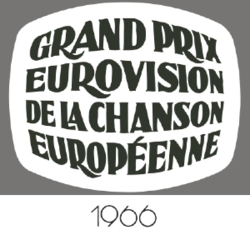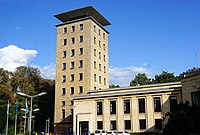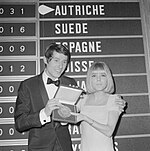The Eurovision Song Contest 1966 was the 11th edition of the annual Eurovision Song Contest. It took place in Luxembourg City, Luxembourg, following the country's victory at the 1965 contest with the song "Poupée de cire, poupée de son" by France Gall. Organised by the European Broadcasting Union (EBU) and host broadcaster Compagnie Luxembourgeoise de Télédiffusion (CLT), the contest was held at the Villa Louvigny on 5 March 1966 and was hosted by Luxembourgish television presenter Josiane Chen.
| Eurovision Song Contest 1966 | |
|---|---|
 | |
| Dates | |
| Final | 5 March 1966 |
| Host | |
| Venue | Villa Louvigny Luxembourg City, Luxembourg |
| Presenter(s) | Josiane Shen |
| Musical director | Jean Roderès |
| Directed by |
|
| Executive supervisor | Clifford Brown |
| Host broadcaster | Compagnie Luxembourgeoise de Télédiffusion (CLT) |
| Website | eurovision |
| Participants | |
| Number of entries | 18 |
| Debuting countries | None |
| Non-returning countries | None |
| |
| Vote | |
| Voting system | Ten-member juries awarded points (5, 3 and 1) to their three favourite songs. |
| Winning song | "Merci, Chérie" |
Eighteen countries participated in the contest, the same that had competed the year before.
The winner was Austria with the song "Merci, Chérie", performed and composed by Udo Jürgens, and written by Jürgens and Thomas Hörbiger.[1] This was Udo Jürgens third consecutive entry in the contest, finally managing to score a victory for his native country Austria. Austria would not go on to win again until the 2014 edition. This was also the first winning song to be performed in German. The contest is also noted for its historic results for several countries. Austria who came first, Sweden who came second, Norway who came third and Belgium who came fourth all achieved their best results up until then, some of which would stand for several decades. In contrast traditional Eurovision heavyweights such as France, United Kingdom and Italy all achieved their worst result by far up till that point, with the general public in the aforementioned countries meeting these results with a degree of consternation.
The rule stating that a country could only sing in any of its national languages was originally created this year, possibly due to the 1965 edition's Swedish entry which was sung in English.[2]
Location

The 1966 Eurovision Song Contest was hosted in Luxembourg City. The venue chosen to host the 1966 contest was the Villa Louvigny, which was also the venue for the 1962 edition. The building served as the headquarters of Compagnie Luxembourgeoise de Télédiffusion, the forerunner of RTL Group. It is located in Municipal Park, in the Ville Haute quarter of the centre of the city.
Participating countries
| Eurovision Song Contest 1966 – Participation summaries by country | |
|---|---|

All countries who had participated in the 1965 contest returned for a second consecutive year.[2]
Returning artists
| Artist | Country | Previous year(s) |
|---|---|---|
| Domenico Modugno |  Italy Italy | 1958, 1959 |
| Udo Jürgens |  Austria Austria | 1964, 1965 |
Format
A new change in rules was introduced this year, allowing music experts to be present in the juries again. 1966 also marked the year the first ever black singer graced the Eurovision stage, Milly Scott representing the Netherlands. She was also the first singer to use a portable microphone.
This was one of the first contests in which an entry was not accompanied by an orchestra. The Italian entry "Dio, come ti amo" performed by Domenico Modugno had been rearranged since its performance at the Sanremo Music Festival and officially broke the EBU rule that stated the arrangement should be finalised well in advance. During the Saturday afternoon rehearsal Modugno performed the new arrangement with three of his own musicians as opposed to the orchestra, which went over the three-minute time limit. Following his rehearsal Modugno was confronted by the show's producers about exceeding the time limit and was asked to use the original arrangement with the orchestra. Modugno was so dissatisfied with the orchestra that he threatened to withdraw from the contest. Both the producers and EBU scrutineer Clifford Brown felt it was too short notice to fly Gigliola Cinquetti to Luxembourg to represent Italy, so the EBU gave in and allowed Modugno to use his own ensemble instead of the orchestra. Despite websites and the official programme listing Angelo Giacomazzi as the conductor, Giacomazzi actually played the piano for the entry.[4][8]
During the voting process, the presenter (Josiane Shen) accidentally greeted United Kingdom by saying "Good night London". She then realized her mistake and said "Good evening, London". Michael Aspel, who was the spokesperson for the United Kingdom at the time, replied "Good morning, Luxembourg", prompting laughter from Josiane and the audience. Additionally, the Spanish spokesperson gave their results in reverse order, presenting the 5 points first, then 3 points second and then the 1 point third.
Contest overview
| R/O | Country | Artist | Song | Points | Place |
|---|---|---|---|---|---|
| 1 |  Germany Germany | Margot Eskens | "Die Zeiger der Uhr" | 7 | 10 |
| 2 |  Denmark Denmark | Ulla Pia | "Stop – mens legen er go'" | 4 | 14 |
| 3 |  Belgium Belgium | Tonia | "Un peu de poivre, un peu de sel" | 14 | 4 |
| 4 |  Luxembourg Luxembourg | Michèle Torr | "Ce soir je t'attendais" | 7 | 10 |
| 5 |  Yugoslavia Yugoslavia | Berta Ambrož | "Brez besed" | 9 | 7 |
| 6 |  Norway Norway | Åse Kleveland | "Intet er nytt under solen" | 15 | 3 |
| 7 |  Finland Finland | Ann-Christine | "Playboy" | 7 | 10 |
| 8 |  Portugal Portugal | Madalena Iglésias | "Ele e ela" | 6 | 13 |
| 9 |  Austria Austria | Udo Jürgens | "Merci, Chérie" | 31 | 1 |
| 10 |  Sweden Sweden | Lill Lindfors and Svante Thuresson | "Nygammal vals" | 16 | 2 |
| 11 |  Spain Spain | Raphael | "Yo soy aquél" | 9 | 7 |
| 12 |  Switzerland Switzerland | Madeleine Pascal | "Ne vois-tu pas ?" | 12 | 6 |
| 13 |  Monaco Monaco | Téréza | "Bien plus fort" | 0 | 17 |
| 14 |  Italy Italy | Domenico Modugno | "Dio, come ti amo" | 0 | 17 |
| 15 |  France France | Dominique Walter | "Chez nous" | 1 | 16 |
| 16 |  Netherlands Netherlands | Milly Scott | "Fernando en Philippo" | 2 | 15 |
| 17 |  Ireland Ireland | Dickie Rock | "Come Back to Stay" | 14 | 4 |
| 18 |  United Kingdom United Kingdom | Kenneth McKellar | "A Man Without Love" | 8 | 9 |
Spokespersons
Each country nominated a spokesperson who was responsible for announcing the votes for their respective country via telephone. Known spokespersons at the 1966 contest are listed below.
 Finland – Poppe Berg[10]
Finland – Poppe Berg[10] Luxembourg – Camillo Felgen[b]
Luxembourg – Camillo Felgen[b] Netherlands – Herman Brouwer[12]
Netherlands – Herman Brouwer[12] Sweden – Edvard Matz[13]
Sweden – Edvard Matz[13] United Kingdom – Michael Aspel[4]
United Kingdom – Michael Aspel[4]
Detailed voting results
Total score | Germany | Denmark | Belgium | Luxembourg | Yugoslavia | Norway | Finland | Portugal | Austria | Sweden | Spain | Switzerland | Monaco | Italy | France | Netherlands | Ireland | United Kingdom | ||
|---|---|---|---|---|---|---|---|---|---|---|---|---|---|---|---|---|---|---|---|---|
Contestants | Germany | 7 | 1 | 5 | 1 | |||||||||||||||
| Denmark | 4 | 1 | 3 | |||||||||||||||||
| Belgium | 14 | 5 | 3 | 1 | 5 | |||||||||||||||
| Luxembourg | 7 | 1 | 5 | 1 | ||||||||||||||||
| Yugoslavia | 9 | 3 | 1 | 5 | ||||||||||||||||
| Norway | 15 | 1 | 3 | 3 | 3 | 5 | ||||||||||||||
| Finland | 7 | 3 | 3 | 1 | ||||||||||||||||
| Portugal | 6 | 1 | 5 | |||||||||||||||||
| Austria | 31 | 5 | 5 | 5 | 1 | 1 | 3 | 5 | 3 | 3 | ||||||||||
| Sweden | 16 | 5 | 5 | 5 | 1 | |||||||||||||||
| Spain | 9 | 1 | 5 | 3 | ||||||||||||||||
| Switzerland | 12 | 1 | 5 | 3 | 3 | |||||||||||||||
| Monaco | 0 | |||||||||||||||||||
| Italy | 0 | |||||||||||||||||||
| France | 1 | 1 | ||||||||||||||||||
| Netherlands | 2 | 1 | 1 | |||||||||||||||||
| Ireland | 14 | 3 | 3 | 5 | 3 | |||||||||||||||
| United Kingdom | 8 | 3 | 5 | |||||||||||||||||
5 points
Below is a summary of all 5 points in the final:
| N. | Contestant | Nation(s) giving 5 points |
|---|---|---|
| 4 |  Austria Austria |  Belgium, Belgium,  Luxembourg, Luxembourg,  Monaco, Monaco,  Yugoslavia Yugoslavia |
| 3 |  Sweden Sweden |  Denmark, Denmark,  Finland, Finland,  Norway Norway |
| 2 |  Belgium Belgium |  Germany, Germany,  Netherlands Netherlands |
| 1 |  Germany Germany |  Switzerland Switzerland |
 Ireland Ireland |  France France | |
 Luxembourg Luxembourg |  Sweden Sweden | |
 Norway Norway |  Italy Italy | |
 Portugal Portugal |  Spain Spain | |
 Spain Spain |  Portugal Portugal | |
 Switzerland Switzerland |  Austria Austria | |
 United Kingdom United Kingdom |  Ireland Ireland | |
 Yugoslavia Yugoslavia |  United Kingdom United Kingdom |
Broadcasts
Each participating broadcaster was required to relay the contest via its networks. Non-participating EBU member broadcasters were also able to relay the contest as "passive participants". Broadcasters were able to send commentators to provide coverage of the contest in their own native language and to relay information about the artists and songs to their television viewers.[16]
Known details on the broadcasts in each country, including the specific broadcasting stations and commentators are shown in the tables below. In addition to the participating countries, the contest was also reportedly broadcast in Morocco, and in Czechoslovakia, East Germany, Hungary, Poland, Romania and the Soviet Union via Intervision.[4]
| Country | Broadcaster | Channel(s) | Commentator(s) | Ref(s) |
|---|---|---|---|---|
 Hungary Hungary | MTV | MTV | [40] | |
 Poland Poland | TP | TV Polska | [41] | |
 Romania Romania | TVR | TVR | [42] |
Notes
References
External links


